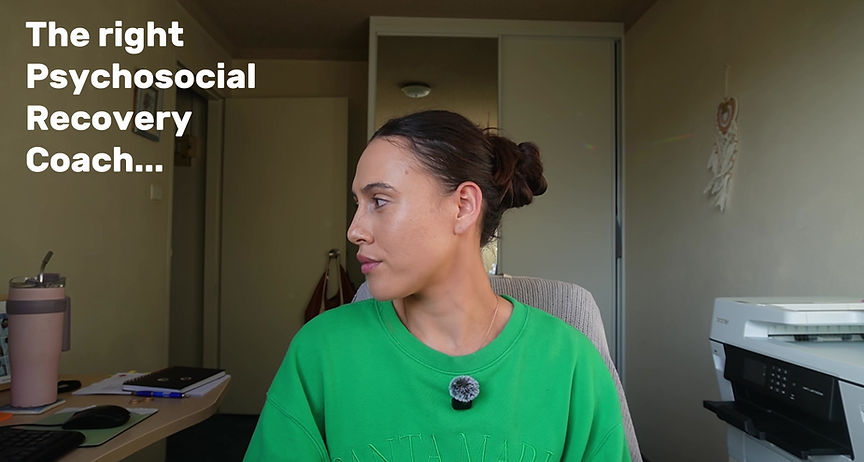
Psychosocial Recovery Coaching That Helps You Feel Like You Again
Why Psychosocial Recovery Coaching?
When life feels like a bit too much, it’s hard to focus on anything other than surviving. Just getting through the day can feel like climbing a mountain.
That’s where psychosocial recovery coaching comes in. It’s not about fixing you. It’s not about telling you what to do.
It’s about walking alongside you while you figure things out - at your pace, in your way.

You’re A Human Being
Not Just A File Or Form
You’re more than a label or a funding category.
You’re a person with goals, feelings, dreams, and off days.
Psychosocial recovery coaching isn’t about ticking boxes or making you feel like a checklist. It’s about building trust and moving forward together.
A good coach gets that some days are tough. They’re not shocked when plans fall through. They don’t judge you when things feel hard. They stay. They listen. They help you break it down, bit by bit.
Real Support Starts With Someone Who Believes You
Tomika’s work has shown this time and again - people thrive when they’re not just heard but believed. When someone says, “That sounds really hard. I’m here. Let’s talk about what’s next.”
That’s the kind of energy you deserve.

What Does A Psychosocial Recovery Coach Actually Do?
They don’t take over. They don’t pretend to know everything.
They don’t expect you to be “on” all the time.
Instead, they:
-
Help you build emotional and social skills.
-
Support you to set your own goals.
-
Keep you motivated when things get tricky.
-
Talk with services and providers so you don’t have to do it all alone.
-
Help you deal with everyday stuff when it feels overwhelming.
They also notice things. Like how your voice changes when you’re tired. Or how your mood shifts when your routine slips. A good coach knows when to pause, when to push, and when to just sit beside you.
It’s kind of like having someone hold your to-do list for a while - not to take it away, but to help you decide what’s important today, and what can wait.
Take The First Step Today
One of the most common things people say before they get started is,
"I don’t know where to begin."
That’s okay. You don’t need to have a plan. You don’t need to have goals written down.
You just need to show up, in whatever state you’re in.
Your coach will meet you there.
One Step At A Time - At Your Pace
They’ll help you figure out the first step. Then the next.
Then the one after that. No pressure. No rush.
Tomika often talks about how coaching works best when it feels like a real relationship. That means checking in, noticing how you’re going, and letting you take the lead - even when you’re not sure where you’re heading yet.
It’s like walking beside someone in the dark. You don’t need a map.
You just need someone who won’t let you fall.
What Makes A Good Psychosocial Recovery Coach?
It’s not about qualifications or jargon.
It’s about whether they feel right for you.
Tomika says the best coaches are the ones who:
-
Make you feel like you can be honest
-
Don’t rush or push
-
Stay consistent and grounded
-
Respect your choices, even when they don’t agree
-
Turn big, scary tasks into small, doable ones
They’re not there to fix your life. They’re there to be in your corner while you work out what feels right.
A good coach is curious - not controlling. They’ll ask what you want, not tell you what to do. They’ll support you without steering you somewhere you don’t want to go.


It’s Not Just About You -
It’s About Life Around You
When you’re supported, the people around you feel it too.
Your relationships shift.
You have more energy. You’re more present.
You start dreaming again.
One of the people Tomika worked with didn’t just get NDIS access - they got housing, financial security, a plan for study, and a renewed sense of possibility.
And it started with a single conversation: "I’m tired, and I don’t know what to do."